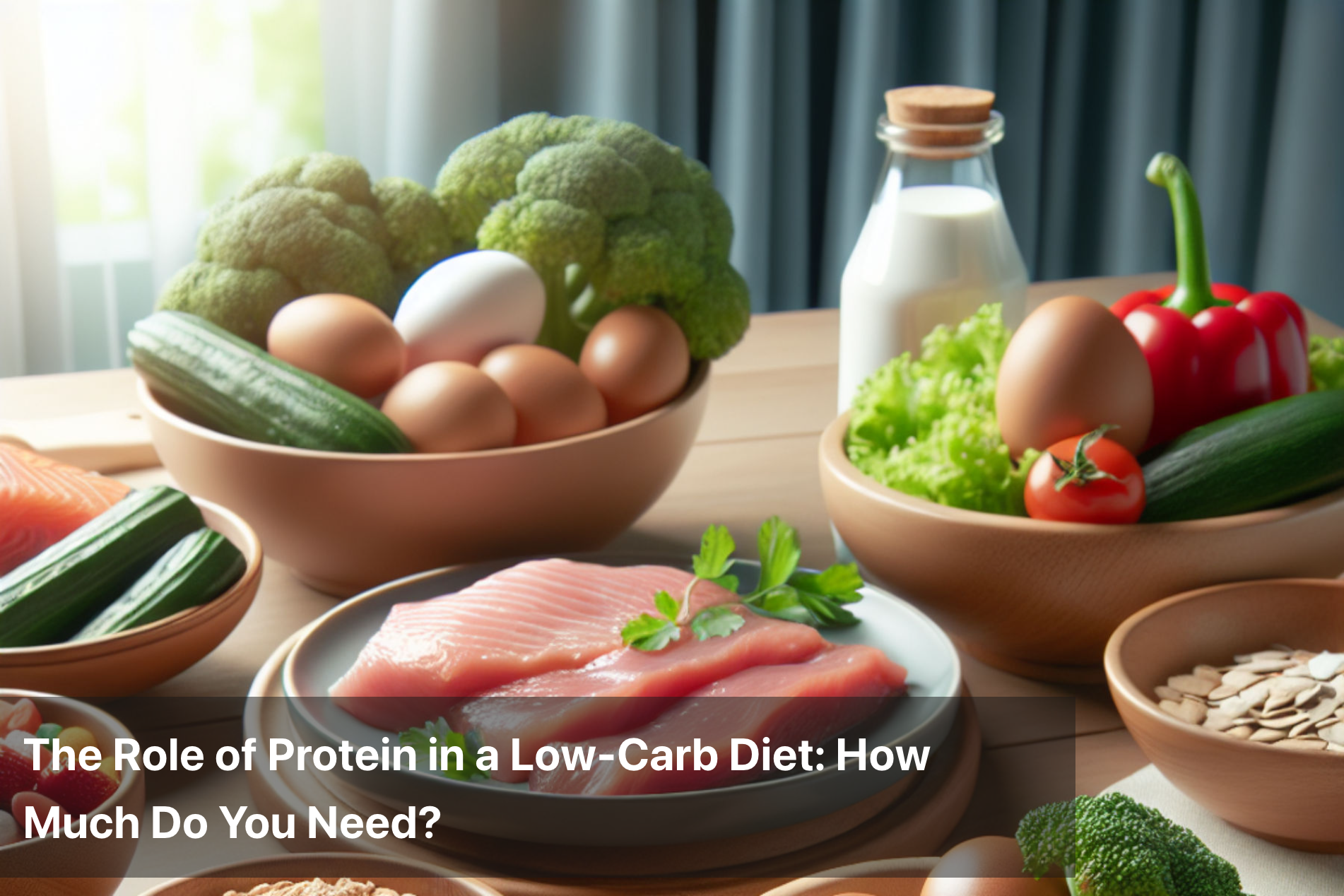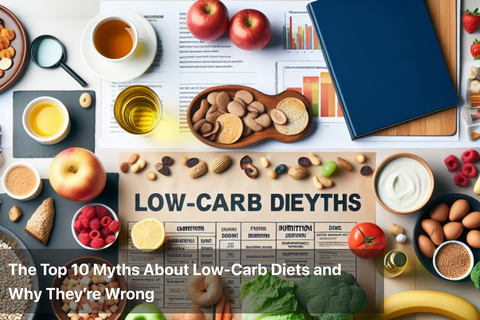
The Role of Protein in a Low-Carb Diet: How Much Do You Need?
Protein plays a critical role in a low-carb diet, serving as a foundational nutrient that supports muscle maintenance, metabolic health, hormone production, and satiety. While reducing carbohydrates helps manage blood sugar and promote fat loss, ensuring adequate protein intake ensures the body has the building blocks it needs to function properly.
A low-carb lifestyle isn't just about cutting carbs—it's about balancing the right nutrients. Protein is essential in that balance, providing energy, preserving lean muscle, and helping regulate appetite. Knowing how much protein you need and choosing the right sources makes a major difference in the success and sustainability of a low-carb approach.

Why Protein Is Crucial on a Low-Carb Diet
Reducing carbohydrates changes how the body uses fuel. With fewer carbs, the body turns to fat and protein for energy. Protein becomes particularly important in this shift for several reasons:
-
Maintains lean muscle mass during weight loss
-
Helps regulate hunger and reduces cravings
-
Supports metabolism and calorie burning
-
Provides the amino acids needed for tissue repair, immune function, and enzymes
-
Prevents muscle breakdown when carbs are low
Without enough protein, the body may break down muscle tissue for energy, which can slow metabolism and weaken overall body composition.
Signs of Inadequate Protein Intake
Not eating enough protein while on a low-carb diet can lead to a variety of symptoms that affect physical and mental performance.
Common symptoms include:
-
Loss of muscle tone or strength
-
Constant hunger or increased appetite
-
Slower recovery after workouts
-
Hair thinning or brittle nails
-
Mood swings or low energy
-
Weakened immunity
-
Plateaued weight loss
These signs indicate the body isn't getting the amino acids it needs to repair tissues and maintain balance.
How Much Protein Do You Need?
Protein requirements vary based on age, gender, activity level, and overall goals. For people following a low-carb diet, the need is generally higher than standard recommendations to compensate for reduced carbohydrates.
|
Lifestyle Type |
Recommended Protein Intake |
|---|---|
|
Sedentary adult |
1.0–1.2 grams per kg of body weight per day |
|
Active adult or weight training |
1.4–2.0 grams per kg of body weight per day |
|
Fat loss with muscle preservation goal |
1.6–2.2 grams per kg of body weight per day |
|
Older adults |
1.2–1.5 grams per kg to maintain muscle and strength |
For example, a moderately active person weighing 70 kg (154 lbs) may need 100–130 grams of protein daily on a low-carb plan.
Best Protein Sources for Low-Carb Diets
|
Protein Source |
Carb Content |
Benefits |
|---|---|---|
|
Eggs and Egg Whites |
~0.5g per egg |
Complete protein, versatile, rich in B vitamins |
|
Chicken, Turkey, Lean Meats |
0g (unseasoned) |
High-quality protein, low fat (if skinless), supports muscle maintenance |
|
Fatty Fish (Salmon, Mackerel, Sardines) |
0g |
Rich in omega-3s, heart-healthy, anti-inflammatory |
|
Paneer and Tofu |
~1–2g per 100g |
Great vegetarian sources, calcium-rich, muscle-building |
|
Greek Yogurt (Unsweetened) |
~3–4g per 100g |
High in protein and probiotics, supports gut and bone health |
|
Protein Powders (Whey, Pea, Collagen) |
~1–3g per scoop (unsweetened) |
Convenient for supplementation, muscle recovery |
|
Nuts and Seeds (Moderation) |
~5–6g per 30g (net carbs) |
Provide plant-based protein, healthy fats, and micronutrients |
|
Lofoods High-Protein, Low-Carb Snacks |
Varies (typically low) |
Convenient, clean, low-carb options tailored for sustained energy and health |
Tips to Distribute Protein Throughout the Day
Protein is best absorbed when consumed in moderate amounts at each meal rather than all at once. Spreading intake across the day supports satiety, muscle recovery, and steady energy.
Tips to manage protein intake effectively:
-
Include a protein source in every meal and snack
-
Start the day with eggs, Greek yogurt, or a protein smoothie
-
Use snacks like nuts or paneer cubes to fill protein gaps
-
Add seeds, protein powder, or nut butters to salads and shakes
-
Track intake to avoid underconsumption
Spacing protein evenly also prevents blood sugar fluctuations and promotes consistent energy.
Precautions When Increasing Protein on a Low-Carb Diet
While protein is essential, more is not always better. Very high-protein diets can place strain on kidneys, especially in those with pre-existing kidney issues. Balance is key.
Precautions to follow:
-
Don’t exceed 2.2 g/kg of body weight unless advised by a healthcare provider
-
Drink plenty of water to support kidney function and digestion
-
Choose lean sources and avoid overconsumption of processed meats
-
Monitor how your body responds to different protein levels
-
Ensure you're still consuming healthy fats and vegetables to support overall nutrition
Moderation and variety in protein sources help avoid nutrient imbalances.
Common Mistakes to Avoid
-
Relying on protein bars or powders without whole food sources
-
Skipping vegetables due to a focus on protein and fat
-
Not eating enough total calories, leading to energy dips
-
Ignoring hydration, which supports protein digestion and metabolism
-
Assuming more protein will automatically lead to more fat loss
Being mindful of these mistakes can help fine-tune your low-carb eating plan.

Sample Protein-Rich Low-Carb Meal Plan
|
Meal |
Example |
|---|---|
|
Breakfast |
Scrambled eggs with spinach and cheese cooked in ghee |
|
Snack |
Handful of roasted almonds or Greek yogurt (unsweetened) |
|
Lunch |
Grilled chicken or paneer with sautéed vegetables and olive oil |
|
Snack |
Protein shake with almond milk and chia seeds |
|
Dinner |
Baked salmon with cauliflower mash and roasted zucchini |
Summary
Protein is a vital component of any low-carb diet. It supports muscle health, enhances satiety, promotes fat loss, and stabilizes energy. Ensuring adequate protein intake prevents muscle breakdown and keeps metabolism strong, especially during periods of reduced carbohydrate intake.
By choosing high-quality sources and spreading intake throughout the day, it's possible to meet your protein needs without disrupting the balance of your low-carb plan. With the support of clean, protein-rich options from Lofoods, maintaining your health goals becomes both practical and delicious.
This Blog post is an initiative by Lo! Foods, to provide accurate and Nutritionist / Doctor approved information related to Health. Lo! Foods is India's leading brand for Everyday Functional Foods. Foods designed for specific Health conditions or Needs. Lo! Foods also runs India's largest range of Low Carb Healthy Cloud Kitchens, under the brand names of Lo!, ProteinChef, ATH (All Things Healthy) and DiabeSmart.













Leave a comment
Your email address will not be published.